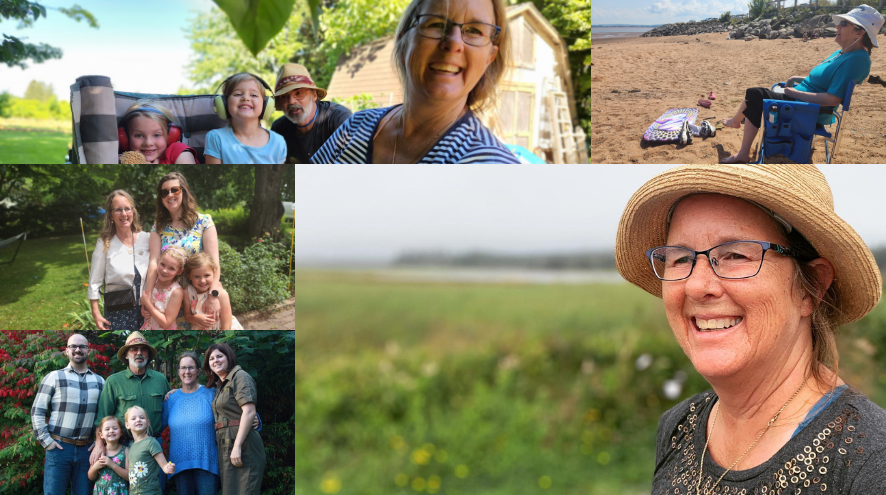Leaning into Joy
Kailey, member of our Advisory Committee of Lived Experience, shares her story of caring for her mom, Stephanie.

Kailey Durette was in her mid-twenties when her mother was diagnosed with younger onset Alzheimer’s disease.
Her Mom, Stephanie Curry, was 49 years old, a busy professional, and a former competitive swimmer and gymnast who still played soccer. Her working life was spent at a long-term care facility owned and run by her parents in Nova Scotia’s Annapolis Valley. Starting as kitchen help in her teens, she had worked her way up to Head Cook and then Food Service Supervisor.
“It’s hard to know exactly when we started seeing symptoms because there was a lot going on at that time,” says Kailey. “I just remember her struggling with things that were very second nature to her, such as ordering food and doing her monthly reports.”
The people she worked with, and even her family doctor, chalked these issues up to stress and menopause. “Mom’s Dad had also recently died and so everyone just thought she was a bit depressed or distracted,” says Kailey. “But I knew there was something else happening.”
At the time, Kailey was an RN, just a few years into her career, and she pushed for her Mom to be seen by the geriatric ambulatory care clinic in Halifax. Stephanie’s tests resulted in the Alzheimer diagnosis, and although knowing what was going on was a huge help, Kailey says the news was also devastating.
“My great-grandmother had Alzheimer’s disease, so my mother had experienced that journey first hand,” says Kailey. “Also, our entire family worked in health care so we were well acquainted with the challenges that those with dementia, and their families, face.” Kailey adds that as a young adult herself, with a brother five years younger, they never expected they would need to support their parents so soon.
Kailey, and her younger brother Michael, immediately contacted the Alzheimer Society of Nova Scotia and both took a six-week course offered through the Caregiver Education Series. Between the course and regular check-in phone calls with the Dementia Helpline, the siblings felt both supported and accompanied on this new journey. They were also able to pass the valuable information they were learning onto their Dad, who would be Stephanie’s primary caregiver.
“My parents were just recent empty nesters and this was not the retirement they’d planned,” says Kailey. “It also really changed their dynamic because my mom was the person who managed the household. There was a lot of learning and I think we’re a stronger family because of it.”
Working together, Kailey’s family were able to keep Stephanie at home, with an excellent quality of life, for the next ten years. She has only recently moved into a long-term care facility but not before she spent her 60th birthday at the Quarterdeck on Summerville Beach with the whole family.
“We got her shoes and socks off and she had her toes in the sand,” says Kailey. “We listened to the Beach Boys and Mom even danced a little bit, and smiled a lot, which made everyone so happy.” But the best moment of the day was when Stephanie surprised everyone by running down the beach with her arms wide open.
“That is her essence; she’s just such an incredibly vibrant person who has always lived life to the fullest,” says Kailey. “And it was like she was shouting to the world that this is what it’s like being 60 and living with dementia.”
This is one of the main things that Kailey, who now works as an educator in dementia care, wants other families to know: A diagnosis is not the end of the story. There is so much living still to be done. And so much potential for joy and gratitude.
Over the years, this has meant keeping Stephanie as active and involved as possible, and in everything from daily tasks, to annual traditions, to family vacations in Italy or Alaska.
“Keeping someone who is living with dementia safe is important, but safety at all costs leads to being closed off and isolated. That’s not what my Mom wanted, or wants, for herself.” Kailey adds that worrying about safety isn’t good for the care partners either. “My Dad always says that if he could go back in time he would worry less and be present more.”
It’s not that there aren’t difficult times and challenging days. There are, but the family does a lot of intentional work to create good moments and lasting memories. “I don't take life for granted and as a family, we don’t wait or put things off,” says Kailey who can easily list off scores of adventures they’ve had since her mother’s diagnosis: camping at Keji, hiking at Prospect Bay, picking strawberries, doing the sunflower maze in Mt Denson, riding in a farm tractor, taking in the view from Blomidon.
“These out-in-the-world experiences have been such a benefit to my kids too. They are growing up understanding who my Mom is; someone who loves being outside, who loves animals and once had a horse, and who is most herself when she is near the water,” says Kailey. “My Mom has been a huge part of their lives and they have been able to witness first hand that she is living with dementia with both grace and dignity.”
Even something as simple as having an ice cream together is meaningful and important. “We take each day as it comes now and we try and live in the moment,” says Kailey. “I have a new appreciation for leaning into the joy of simple moments and being grateful for all the beautiful times we’ve had together."
